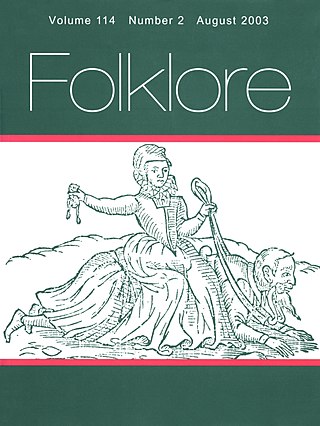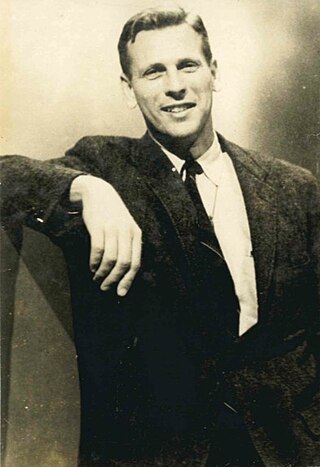Related Research Articles

Folklore is the body of expressive culture shared by a particular group of people, culture or subculture. This includes oral traditions such as tales, myths, legends, proverbs, poems, jokes, and other oral traditions. This also includes material culture, such as traditional building styles common to the group. Folklore also encompasses customary lore, taking actions for folk beliefs, and the forms and rituals of celebrations such as Christmas, weddings, folk dances, and initiation rites.

Folklore studies is the branch of anthropology devoted to the study of folklore. This term, along with its synonyms, gained currency in the 1950s to distinguish the academic study of traditional culture from the folklore artifacts themselves. It became established as a field across both Europe and North America, coordinating with Volkskunde (German), folkeminner (Norwegian), and folkminnen (Swedish), among others.
The American Folklore Society (AFS) is the United States (US)-based professional association for folklorists, with members from the US, Canada, and around the world, which aims to encourage research, aid in disseminating that research, promote the responsible application of that research, publish various forms of publications, advocate for the continued study and teaching of folklore, etc. The Society is based at Indiana University and has an annual meeting every October. The Society's quarterly publication is the Journal of American Folklore. The current president is Marilyn White.
Henry Glassie College Professor Emeritus at Indiana University Bloomington, has done fieldwork on five continents and written books on the full range of folkloristic interest, from drama, song, and story to craft, art, and architecture. Three of his books -- Passing the Time in Ballymenone, The Spirit of Folk Art, and Turkish Traditional Art Today -- were named among the "Notable Books of the Year" by The New York Times. Glassie has won many awards for his work, including the Charles Homer Haskins Prize of the American Council of Learned Societies for a distinguished career of humanistic scholarship. A film on his work, directed by Pat Collins and titled Henry Glassie: Field Work, had its world premiere at the Toronto International Film Festival in 2019.
William Roy MacKenzie was a Canadian folklorist and writer who collected songs and ballads in Nova Scotia in the early 20th century.
George Korson was a folklorist, journalist, and historian. He has been cited as a pioneer collector of industrial folklore, and according to Michael Taft of the Library of Congress, "may very well be considered the father of occupational folklore studies in the United States." In addition to writing and editing a number of influential books, he also issued his field recordings of coal miners on two LP records for the Library of Congress.

Tristram Potter Coffin was an American folklorist and leading scholar of ballad texts in the 20th century. Coffin spent the bulk of his career at the University of Pennsylvania, where he was a professor of English and a co-founder of the Folklore Department. He was the author of 20 books and more than 100 scholarly articles and reviews.
Phillips Barry was an American academic and collector of traditional ballads in New England.
Maria Leach was an American writer and editor of books on folklores of the world. A noted scholar, she compiled and edited a major reference work on folklore and was the author or editor of thirteen books for adults, young people, and children.
Kenneth S. Goldstein was an American folklorist, educator and record producer and a "prime mover" in the American Folk Music Revival.
Donald Knight Wilgus was an American folk song scholar and academic, most recognized for chronicling 'Hillbilly', blues music and Irish-American song and his contribution to ballad scholarship.
John Barre Toelken was an award-winning American folklorist, noted for his study of Native American material and oral traditions.
Judith McCulloh was an American folklorist, ethnomusicologist, and university press editor.
Don Yoder was an American folklorist specializing in the study of Pennsylvania Dutch, Quaker, and Amish and other Anabaptist folklife in Pennsylvania who wrote at least 15 books on these subjects. A professor emeritus at the University of Pennsylvania, he specialized in religious folklife and the study of belief. He is known for his teaching, collecting, field trips, recording, lectures, and books. He also co-founded a folk festival in Pennsylvania, which is the USA's oldest continual annual folklife festival, and is credited with "bringing the idea of "folklife" to the United States".
Ellen Stekert is an American academic, folklorist and musician. Stekert is a Professor Emerita of English at the University of Minnesota and a former president of the American Folklore Society.
Elaine J Lawless is an American folklorist. She is Curators' Professor Emerita of English and Folklore Studies at the University of Missouri. In 2008 she was elected president of the American Folklore Society.

Jane C. Beck is an American folklorist and oral historian. She is Executive Director Emeritus and founder of the Vermont Folklife Center and has published research on the folklore of Vermont and on African American belief systems.
Joan Newlon Radner is an American folklorist, storyteller and oral historian. She is Professor Emerita at American University in Washington, DC.
John W. Roberts is an academic who specialises in Folklore, African-American Studies and English Literature. His work has argued for the "integrity, authenticity, and authority" of African-American vernacular traditions.
Henry Marvin Belden (1865-1954) was an American Folklorist and pioneer collector of folksongs and ballads from Missouri.
References
- 1 2 3 4 "MacEdward Leach and the Songs of Atlantic Canada | Biography - Personal". www.mun.ca. Retrieved 2022-05-19.
- ↑ Leach, MacEdward (1916). The Holy Grail: being a comparison of the ceremony described in the Arthurian romances with the rites of initiation among primitive peoples (Thesis). OCLC 435687767.
- 1 2 3 Hand, Wayland D. (1968). "MacEdward Leach (1896-1967)". Western Folklore. 27 (1): 43–44. ISSN 0043-373X. JSTOR 1498771.
- 1 2 "MacEdward Leach and the Songs of Atlantic Canada | Biography - Training". www.mun.ca. Retrieved 2022-05-19.
- ↑ "Maria Leach Dies at 85, Editor Of Major Works, Covering Folklore". The New York Times. 1977-05-24. ISSN 0362-4331 . Retrieved 2022-05-19.
- 1 2 3 Clements, William M; American Folklore Society (1988). 100 years of American folklore studies: a conceptual history. Washington (D.C.): American Folklore Society. OCLC 600721489.
- ↑ "MacEdward Leach and the Songs of Atlantic Canada | Biography - Fieldwork". www.mun.ca. Retrieved 2022-05-19.
- ↑ Diamond, Beverley; Brodie, Ian (2013). "MacEdward Leach and the Songs of Atlantic Canada" (PDF). Oral Tradition. 28/2: 335–340.
- ↑ Greenway, John; Abrahams, Roger D.; Alspach, Russell K.; Beck, Horace P.; Briggs, Katharine M.; Browne, Ray B.; Coffin, Tristram P.; Dorson, Richard M.; Fenton, William N.; Garbáty, Thomas Jay; Gillmor, Frances (1968). "MacEdward Leach, 1892-1967". The Journal of American Folklore. 81 (320): 97–120. ISSN 0021-8715. JSTOR 537661.
- ↑ "Past AFS Presidents". The American Folklore Society. Retrieved 2022-05-19.
- 1 2 American folklore : an encyclopedia. Jan Harold Brunvand. New York. 1996. p. 910. ISBN 0-8153-0751-9. OCLC 34046325.
{{cite book}}: CS1 maint: location missing publisher (link) CS1 maint: others (link)